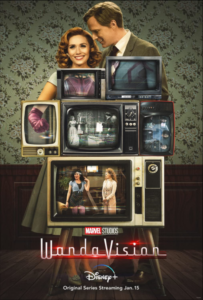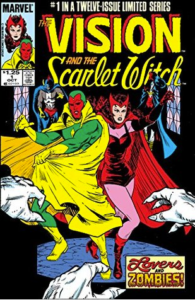By the time I finally got around to watching Disney+’s WandaVision, I’d been thoroughly spoiled by the Internet as to what to expect. And not just because the Internet loves its reaction gifs, but because even when sources were being circumspect, my longstanding familiarity with mainstream and especially Marvel comics meant that I instantly understood what everyone thought they were only hinting at. It’s going to be hard to write the rest of this review without probably doing the same for readers who have yet to watch the show or seen the comics they’re loosely based on, so if you’re the kind of person who thinks spoilers necessarily detract from enjoying entertainment, please stop reading here (but also, I commend you for your skill in avoiding all the bountiful spoilers so far for both show and books!)
 WandaVision is the clever title for this 9-episode series, with each episode lasting between 30-50 minutes, making for exceedingly bingeable viewing even if it weren’t so immediately absorbing. The first seven episodes are some of the best television I’ve watched in ages, anchored by Elizabeth Olson’s tremendous performance. At the end of the very first episode, she had me in inexplicable tears. I don’t know if her expression at the end of the episode was more poignant because I knew where all this was heading, or if unsuspecting viewers were similarly affected: all I know is that I was sobbing and completely hooked.
WandaVision is the clever title for this 9-episode series, with each episode lasting between 30-50 minutes, making for exceedingly bingeable viewing even if it weren’t so immediately absorbing. The first seven episodes are some of the best television I’ve watched in ages, anchored by Elizabeth Olson’s tremendous performance. At the end of the very first episode, she had me in inexplicable tears. I don’t know if her expression at the end of the episode was more poignant because I knew where all this was heading, or if unsuspecting viewers were similarly affected: all I know is that I was sobbing and completely hooked.
Most of the episodes are structured after classic sitcoms from the 1950s to the 2000s. In the first episode, patterned after The Dick Van Dyke Show, Wanda and Vision are settling into black and white suburban life in Westview, New Jersey. A misunderstanding over the calendar leads to a comedy of errors as Vision brings his boss and boss’ wife over for dinner on a night Wanda thought was meant to be a romantic occasion. Wanda must quickly whip up an appropriate multi-course meal with the assistance of her nosy but helpful new neighbor Agnes (No Prizes if you figure out who Agnes really is early on!) To add to the stress of the occasion is the fact that Vision must hide his android nature while Wanda must also hide her powers. Things wrap up happily, 50s sitcom-style, but several strange incidents intrude on their domestic bliss, and Wanda’s face as the credits roll is a mix of happiness and bleak terror that shook me to the core.
As the series progresses, it becomes clear that Wanda is desperately trying to build a picture-perfect sitcom life for her and Vision who, so far as we know, is supposed to be Dead dead. The circumstances of how she’s doing this are only one intriguing part of the show, with amazing supporting character casting bringing back Randall Park’s Jimmy Woo and Kat Denning’s Darcy Lewis, and introducing Teyonah Parris as Monica Rambeau and Evan! Peters! as Pietro Maximoff. Seriously, the one bit where Wanda asks Pietro what happened to his accent had me screaming, “What happened to YOURS?!” a beat before he said the same thing, tho in a much less hysterical tone than mine (the question of her accent has long been one of my biggest pet peeves with the Marvel Cinematic Universe.) Stunt-casting Evan Peters is one of the best TV flexes I’ve ever seen. Kathryn Hahn is also a delight throughout, until the last two episodes, where her character becomes a mere plot device to explain things to viewers. When she dramatically exclaims, “The Scarlet Witch!” I burst out laughing: hardly the intended response, and through no fault at all of the actress given this suddenly ludicrous script.
 The script/plot of WandaVision, so smart and empathetic for the first seven episodes, begins to falter in the penultimate before crashing to a flaming death in the last. The very cool premise of it being “Agatha All Along”, as the show claims at the end of episode 7, is quickly dispelled to anyone paying attention. While Agatha was drawn to Wanda’s reality-rending display of power and wants to take it for herself, the extent of her meddling has only to do with Wanda’s “scripts” as she seeks to provoke Wanda into giving up the secret of her abilities. The enslavement of the people of Westview is all Wanda (with some encouragement from the villainous acting head of SWORD.)
The script/plot of WandaVision, so smart and empathetic for the first seven episodes, begins to falter in the penultimate before crashing to a flaming death in the last. The very cool premise of it being “Agatha All Along”, as the show claims at the end of episode 7, is quickly dispelled to anyone paying attention. While Agatha was drawn to Wanda’s reality-rending display of power and wants to take it for herself, the extent of her meddling has only to do with Wanda’s “scripts” as she seeks to provoke Wanda into giving up the secret of her abilities. The enslavement of the people of Westview is all Wanda (with some encouragement from the villainous acting head of SWORD.)
And I cannot adequately express the extent of my full-body cringe when the series finale has a Black woman descended from enslaved people comfort Wanda, who is surrounded by the now freed but still justifiably angry and suspicious townsfolk, with, “They’ll never know what you sacrificed for them.” ARE YOU FUCKING KIDDING ME?! Wanda enslaves an entire town of people in order to build her fantasy world, and when she’s made to give up her slaves, sacrificing her fantasy in the process, the show has a Black woman comfort and absolve the white lady?! GTFOH, show! Wanda could 100% have brought back Vision and built her family without torturing and manipulating dozens of people. The fucking audacity to imply that she was the victim or even the hero of the piece nearly murdered the brilliance of the first seven episodes for me.
Atrocious ending aside, I actually really enjoyed how the show took the decades worth of Scarlet Witch and Vision material and gave it coherent form here, merging it seamlessly with the MCU to provide a mostly entertaining experience. Marvel has cleverly capitalized on the show to recently put together a volume collecting Scarlet Witch and Vision titles, which I’m linking to below, but if you really want to do a deep dive into the source material, I’d strongly recommend looking into both Marvel’s House Of M collection as well as the Vision limited series, which does not star Scarlet Witch but does deal darkly with the matter of Vision and his unusual family trying to fit into suburbia.
WandaVision is available to stream from Disney+. Vision & The Scarlet Witch: The Saga Of Wanda And Vision was published January 12 2021 by Marvel Comics and is available from all good booksellers, including
Want it now? For the Kindle version, click here.

1 pings
[…] faded soon after the turn of the 21st century (I hated House Of M waaaaay before the dire ending of WandaVision, lol.) As such, I’ve definitely missed out on Mr Duggan’s work in comics, tho my […]